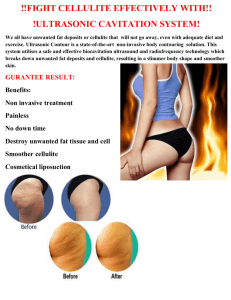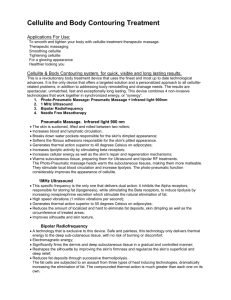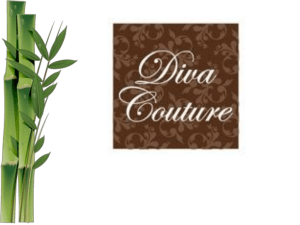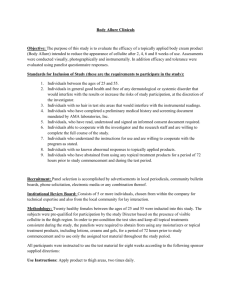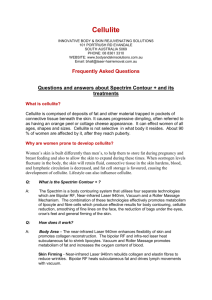TCS | Episode 113 | Cellulite FACTS vs MYTHS
advertisement
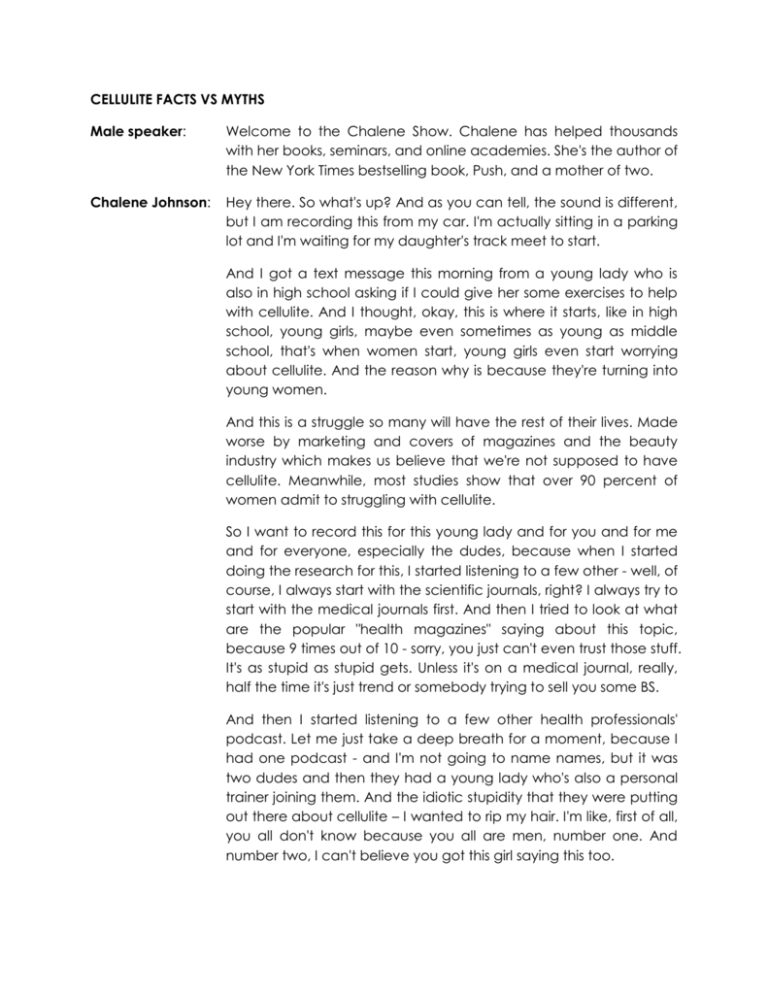
CELLULITE FACTS VS MYTHS Male speaker: Welcome to the Chalene Show. Chalene has helped thousands with her books, seminars, and online academies. She's the author of the New York Times bestselling book, Push, and a mother of two. Chalene Johnson: Hey there. So what's up? And as you can tell, the sound is different, but I am recording this from my car. I'm actually sitting in a parking lot and I'm waiting for my daughter's track meet to start. And I got a text message this morning from a young lady who is also in high school asking if I could give her some exercises to help with cellulite. And I thought, okay, this is where it starts, like in high school, young girls, maybe even sometimes as young as middle school, that's when women start, young girls even start worrying about cellulite. And the reason why is because they're turning into young women. And this is a struggle so many will have the rest of their lives. Made worse by marketing and covers of magazines and the beauty industry which makes us believe that we're not supposed to have cellulite. Meanwhile, most studies show that over 90 percent of women admit to struggling with cellulite. So I want to record this for this young lady and for you and for me and for everyone, especially the dudes, because when I started doing the research for this, I started listening to a few other - well, of course, I always start with the scientific journals, right? I always try to start with the medical journals first. And then I tried to look at what are the popular "health magazines" saying about this topic, because 9 times out of 10 - sorry, you just can't even trust those stuff. It's as stupid as stupid gets. Unless it's on a medical journal, really, half the time it's just trend or somebody trying to sell you some BS. And then I started listening to a few other health professionals' podcast. Let me just take a deep breath for a moment, because I had one podcast - and I'm not going to name names, but it was two dudes and then they had a young lady who's also a personal trainer joining them. And the idiotic stupidity that they were putting out there about cellulite – I wanted to rip my hair. I'm like, first of all, you all don't know because you all are men, number one. And number two, I can't believe you got this girl saying this too. Ugh! The things they were saying, the myths that they were propelling by making people believe - and here's the health podcast, putting themselves out there as health professionals and trying to say that you can exercise away cellulite. No, you can't! It's normal. 90 percent of women have cellulite. I was so liberated when I heard that Julienne Michaels talked about it on one of her podcasts. So she's like, "Listen, I've got cellulite in my thighs, it's genetic. There's nothing I can do about it. You won't see me filming short shorts." And I'm like, "Hooray!" Like, "Thank you." I wish more people would be freaking honest about this and instead of holding out this ideal that it's not even human. But there are some things you can do to diminish the appearance of it, but I first just need to like set this record straight, okay? Because men have to deal with male patterned baldness and women have to deal with cellulite. Think about that for a second. Do all men have to deal with male patterned baldness? Do all men go bald? No. But have you noticed that most men who do go bald, go bald at about the same age their father did or their grandfather did? Have you also noticed – women, I bet you know this is true. If your mom has like awesome - or your grandma or your family has awesome, beautiful skin, you, too, probably have the genetic gift of amazing skin. You see, there's one really big factor that we can't change - you can't cream it away, you can't exercise it away, you can't laser it away - and that's your DNA. The same way that a man can't change the fact that he is predisposed for baldness, a woman cannot change the fact that she's predisposed for cellulite. Now, can a man take some proactive steps and like, you know, use some topical creams and eat the right food and be super healthy, and that may improve growth of hair? Sure! But it doesn't change the fact that if you're going to go bald, it's going to happen because it's in your DNA. Okay. So what do we need to know about cellulite? Well, let's go there. The first, thing you need to understand is that we've made cellulite like this terrible, awful thing. Like if you have cellulite that means your fat or you're out of shape or you're not working hard enough which is so ludicrous. It's ridiculous. It drives me crazy that that is the myth because it's not true. Certainly, there are so many other factors that you're going to hear in this podcast, and I hope that we can just kind of change our thinking about this because it has nothing - well, it can have nothing to do with your level of fitness, how strong you are, and how well you eat. Some people are just more genetically disposed to have cellulite than others. And it drives me crazy that we've just become obsessed with removing - it's like becoming obsessed with removing freckles. Like some people have them, and some people don't. I can have fewer of them by staying out of the sun, but not entirely. I'm still going to get them because I'm Scottish and I'm Irish and that's my skin type. You know, it's really no different than just putting these predisposed decisions on our culture and our society of what's beautiful and what perfection is and what we're all supposed to look like. And it's just, it a bummer, to be honest. So I want to give you some real talk about cellulite and what it really is, and can you do something about it. And let me just shortcut you and understand - like, get to the point. Here's the point, you can do something about it but not much. You can diminish the appearance of it to a certain degree. Now, once you're at a healthy body weight and you're at a really great body fat percentage, meaning, you know, if you're at 30 percent body fat and you're predisposed for cellulite, you know, the only thing you can do is lose body fat because it's going to be made worse by your level of body fat at the moment. But if you're at a super low body fat and you're lifting and you're eating right and you have cellulite, you have cellulite. So what? Who freaking cares? So you've got this, you know, beautiful face and you've got freckles. So what you've got freckles? So you're super lean and your body is amazing and you eat healthy and you take care of yourself and you sleep right and you're going bald. So what? That's how God made you. Like we were all not meant to be "perfect" because who's even to decide that? So the first thing you have to understand is that we can diminish the appearance but we mainly do so with the right food and diet. And that can only be determined by what our genes have made possible. Does that make sense? So even thin women in excellent physical condition can and do have cellulite. Cellulite is not a weight issue. It's not even a fat issue. Get this, cellulite is a skin issue just like sagging skin, just like dry skin, just like stretch marks, skin that scars easily. Like you've seen people who, when they get a scar, it really keloids, right? It kind of like spreads out really wide. And no matter how much cream they put on a scar, it still just spreads, the keloids. And that's a condition of your skin. We can't change that. We can improve it slightly but that's in your genetic DNA make up. And so, too, is cellulite a part of your DNA make up. It's a condition of the subdermous layer of your skin, and we rarely see it in men. And I guess the statistics are that between 8 to 10 percent of men say that they have cellulite. And those men, we know, typically have a higher level of estrogen and carry body weight, or body fat I should say, in their lower body. Other than that, most men, because of their testosterone level as compared to their estrogen level, have very little, if any, lower body fat, right? And they certainly don't struggle with cellulite the same way a woman will. Now what we do know about the connective tissues of a man is that it's more almost basket or web-like so it's tighter. They have subcutaneous fat as well, but you won't see it. Whereas women, we carry subcutaneous fat and the layers or fibers that hold the fat underneath our skin and above the muscle is much more lax, is the only way I can describe it. And for women, our connective tissues are much softer, looser, and therefore they - it's easy to push stuff through it. That stuff being our subcutaneous fat. Men have subcutaneous fat, too. Theirs just doesn't show up as much. Now that subcutaneous fat is above the muscle. "So Chalene, is that saying that if I build my muscle, that that could make my cellulite appear more obvious?" No. And here's why. Because as you build muscle, what happens? Yeah. You reduce body fat. So as you're building muscle, you're reducing body fat, so you're filling out the shape of your legs, your arms, your biceps, your quads. So the difference between men and women beneath the skin is far greater than what we assume. A female fetus, we know that it begins to form these connective tissues in a way that's very different than a male fetus does as early as four to eight months. A female fetus will form connective tissue that is vertical, whereas the male fetus forms connective tissue beneath the skin that is web-like, so it's horizontal and vertical like [spanks 0:10:34]. That's not fair, they've got permanent [spanks 0:10:37]. So the women who are in that very small 8 to 10 percent who say that they don't struggle with cellulite, typically you will find that they have a very high level of testosterone. These are women who tend to develop muscle very, very easily. They have - some people will say, "She looks like a man," or "She's too masculine." These are women who typically don't have to lift weights, they just have very strong shoulders and they develop muscles very, very easily. From society's standpoint, people may say that these women tend to look more masculine. And that is because they don't have rounded hips, they don't carry body fat in the same place as most women carry body fat. You can call it a curse or a blessing. I think just being alive and having a body is a blessing. We don't all have to be the same. Yes, there are some women who genetically have much lower estrogen and much higher testosterone and therefore, these are the women who always have abs. They can eat French fries and take a couple of months off the training. And they just genetically have more muscle, more testosterone. And the women who have a higher level of estrogen tend to have more body fat. They tend to -- even if they don't have more body fat, they tend to have vertical arrangement of those connective tissues, and therefore, they tend to have a greater appearance of a cellulite. Let me give you another example. Today, as I'm in the parking lot at this track meet - these are high school- and middle school- aged girls - and I'm walking behind two girls and I've just gotten this text from another high school girl about her body and, you know, how do I get rid of cellulite? And so I'm thinking about this. I'm thinking to myself - you know, I'm looking at all these women and all these girls in this environment, right? And I'm in a huge stadium. I'm looking at all the different body types. And because it's a track meet, you're seeing a lot of their bodies. Girls run in really short shorts. They just do. That's just what they run in, it makes them go faster. And I'm walking in behind two runners. One is very tall and thin very, very thin. I would guess that she's probably 110 pounds and 5'9, 5'10. Long runner, probably distance runner, and I'm standing behind her in line and I can see in the backs of her thigh just a little bit of cellulite, just the littlest bit. Standing next to her is another girl who's got some bu-bump, bubump, bump. Like girlfriend's got a booty, and it's not a muscle. She's got some weight on her - I'll just say it, as it is. She's not as lean as the tall, skinny girl next to her. Now the girl who's got some bu-bump, bu-bump, bump, she's got like thick legs and a thick booty, and she's got some rolls on the sides of her shorts. So what I'm trying to say is she's not perfect. She's probably has a higher body fat, but all of her skin is smooth. Zero cellulite, just smooth skin. So who's going to struggle with her body image? The girl who's a little overweight? Or the girl who's got cellulite? I'm going to tell you who's going to struggle with their body image. Both of them. Because we just expect women and girls to be perfect. It's just crazy to me. It's crazy to me that we have so shamed and turned this thing, cellulite, into something like, "Everyone must get rid of it." It's like freaking out over freckles. We shouldn't freak out. We should try to do the best that we can, but it's ridiculous. It's ludicrous that we've just villainized this thing that what it has to do is this connective tissue. And we can't change our connective tissue without surgery or some very expensive procedure. So I want to talk to you about procedures. Can you diminish the appearance of cellulite? Well, I can tell you that there are none that I can that are 100 percent conclusive that any topical cream or ointment or oil permanently reduces cellulite. Can it reduce the appearance temporarily? Sure. But there are lots of people who say it doesn't, because it would have to penetrate not only your first layer of skin, it would have to go all the way down to that first layer of fat. And that's pretty tough to do with coffee grinds or oils. But there are those who swear by it. So if it makes you feel better and if it's reduced the appearance for you, awesome. I just don't want you to waste your money on something that is probably very temporary. What about wraps? Again, that pulls water to the surface of your skin. It can definitely diminish the appearance temporarily until you have a glass of water and a saltine cracker and then it's coming back. So yeah, if you've got a photo shoot or something that - and it makes you feel more confident, go for it. Just don't waste your money thinking that you're getting a permanent solution. What about liposuction? No, no, capital no, no with an exclamation mark. Now you're messing with God, in my opinion. Like I'm fine with cosmetic surgery - don't get me wrong. I'm going to pull it up and tighten it and, you know, saw it all back together someday when I need that - you know, you're listening - listen, my mentor when it comes to plastic surgeries - I don't have one. But I'm just saying like I'm got against it, that's all I'm saying. But when it comes to liposuction, that's a waste of time because your body wants your fat in a particular position. And I know this because I've trained hundreds of personal training clients, females, women here in Orange County, Newport Beach, who've had that sucked out. And let me tell you, it just never looks right. It moves around and your body is trying to figure out what the heck you've done. And our bodies are such a delicately tuned machine that when you take out a part and move things around, the body isn't quite sure what to do. And I have just seen nightmare after nightmare. That looks great in a pair of jeans, but man, they're like, "I wish I'd never done" - it just never looks right. It always looks weird. And I haven't met a woman yet who's happy that she did it. Okay. So what about laser or injections and heat treatment? Well, again, there are some studies that show that some people have had permanent result from very, very, very expensive ongoing treatments. So sure, I could share with you the results of those, but what I would rather do is just have you know it's normal. Can some women have zero cellulite? Yeah. But it's so rare. And you're going to have something out. You're going to have very high level of disaster on likely. And you have to have extremely low body fat. So okay, so let's say, genetically - let's keep talking about this. Let's just say, genetically, your mom, your grandma, have cellulite on their arms, their thighs, their stomach, their legs, whether they're thin or heavy. They're just at a certain age - you just know the women in your family have cellulite. The likelihood of you having cellulite is extremely high. So should you just give up? No, of course not. How can you diminish it? How can you make it less obvious? Well, let me tell you the best way possible - good lighting. Hello? Can we talk to the department stores about not having the most unattractive, unflattering, disgusting fluorescent lights above us, especially when we're trying on bathing suits? That's just rude you all. Like come on, put some candles in there would you? I mean, you would sell 10 times more bathing suits if you just put some candle light in there. I mean, I'm a very confident woman when it comes to my body. In fact, I want to share this with you, I just spent some time talking about this with the girl who does my spray tan. I do not go in [a tanning 0:18:26] booth, I use an all organic lovely spray can from Knockout Tan. And so this is Kristen, she's been spray tanning to me for like five years, I think. And she has seen more naked women in a vulnerable state, and just about anybody I know. And so we were talking about this and how sad it is that even the most fit of women struggle with this. Who do you find the most self conscious about the body? Kristen: The best body because their - they're expected - they've gotten there. They've gotten to the [inaudible 0:19:01], they've gotten to the elite and they're happy. There's nowhere else to go but they want to go more. Chalene Johnson: And they feel like, "Now you've seen me naked, and so you might see my flaws." Kristen: Yes. Chalene Johnson: And I'm supposed to be perfect. Kristen: Yup. Chalene Johnson: So what are some of the things you've heard? What is the most common? Kristen: "Oh my God, I'm bloated because I had a tortilla," or you know, things like that, what they just ate to make them bloated for that moment [inaudible 0:19:21]. I'm like, "Really?" [You're probably 0:19:24.0] one of the only ones that have never said anything ever because you don't, you're just so secure. You know when you have a secure person. But most everyone else, you're probably the only one that has never said anything about the body. Yup. Just come in and tan them. And we never talk about body. Chalene Johnson: So how many women you think you tanned? Kristen: Oh my God, over 10,000 for sure. Chalene Johnson: What percentage of women say something about their body? And what percentage don't say anything, just jump in there, kind of with confidence? Kristen: Five percent, maybe. Chalene Johnson: What percentage of men? Kristen: Oh, 95 percent. Chalene Johson: Say nothing about their body. Kristen: "Can you tan me naked?" Chalene Johnson: Oh my God. Kristen: Yes. And "Oh, that feels good." Chalene Johnson: And you heard Kristen say there that I'm one of the few women she knows who doesn't talk about or doesn't put herself - I don't put my own body down because I love my body. Somebody else can put it down. Good for you, but I'm not going to put my body down. This is a gift from God and imperfections and all, right? And I'm not going to put my body down because I have a daughter, and I want her to feel amazing about her body. So if I'm ripping on myself, I might as well be ripping on her. So I want her to know that I love my body. I can't even believe what it's done for me. It is insane what this little tiny body has done for me. And it's not perfect, thank God, right? Because if it was perfect then a lot of other areas of my life would be imperfect. So I'm down with God being fair in all these things. Nonetheless, there are times when I'm in the dressing room - and I'm going to name names right now - at Nordstrom and go, "Who is that woman?" and "Where did that body come from? Because that is not the body I've been working so hard on. I don't know who changed out these mirrors, but that is not my image." Nordstrom, if you're listening, could you please invest in better lighting? There's this little bikini store in Newport Beach called Beach Bunny, let me tell you, they charge about a $1 million per bathing suit pretty much, and I'll pay it. You know why? Because the lighting in their dressing rooms, you're like, "Damn, I should eat a burger, and I should be on the cover of Maxim magazine right now. I've never looked so good. Whoo! Abs. I didn't know" - and like it's the best lighting. I'm like, "This is brilliant." So if you have a fat mirror and a skinny mirror, get rid of fat mirror and only look in your skinny mirror because that mirror is the one that's telling you the truth anyways. Back to what you can do about it. So it is what it is. How can we make it better? We've been dealt a hand, right? A genetic hand. But how we play that hand is up to us. So while, genetically speaking, my mother and my grandmothers, they all have that same type of loose connective tissue that's incredibly common in Scottish and Irish women. So that's my previous position, yes, I have bumpy skin in areas that I wish it were smooth like a baby, like a 10-year-old. But it's not, and that's okay. And all I can do is do my best. So I can keep my body fat as low as I should and as low as I want it to be and still live a life. Like I am not willing to do the things that some other women do. I won't diet down for a video. Everyone's freaking out like, "Oh, we've got this big, you know, beach body summit. And we've got - I've got a photo shoot on this day and I have this on that day." I'm like, "I am living my life and I'm not going to diet down for four weeks or two weeks or three days. Before I do something I'm going to show up as I am." And I just feel like that's more authentic, and I think it's more real. And I might be up three pounds or down three pounds, it is what it is, but you're not going to get like a highlighted version of me. You're going to get me, the same way you would get me a week after the shoot or a week after that event or two weeks after that appearance. I just think that's - I want people to see how I live. I don't want them to see what I did to the extreme and how I prepared for seven days before it by not eating and taking water pills and eating lettuce and a toothpick for dinner. No, thank you. I don't get that. And it drives me crazy when people do that. Like, live your life. Live your life and just do the best that you can and live life. That's all that I can say, is live life and be your best. So I try to eat non-processed foods, but I have some. But 80 percent of the time I'm going to eat non-processed foods. I try to eat foods that diminish the appearance of anything that's, you know, unattractive, like bloating and dark circles under my eyes and puffiness. So I try not to eat processed foods. I try to keep my sugar intake very low. I try to eat tons of plant-based protein. I'm not a vegan but I don't eat much red meat. I just don't. I prefer fish, a little bit of chicken and lots and lots of vegetables. So that helps. I also try to make sure that I get enough sleep because we know that sleep and stress causes to hold on to fat. So for holding on to fat, that's going to make us have a greater appearance of, yup, cellulite. Let's see what else can we do to help diminish it? Exercise, because that circulation really helps, and of course, to lower our body fat through exercise. And that includes not just cardio you all, because cardio is not going to necessarily reduce your body fat. What reduces your body fat is increasing your lean muscle mass. Increasing your lean muscle mass requires strength training, HIT training, training the right way. So there are ways you can train that will help reduce body fat, but not a specific way you can train to reduce cellulite. Okay. One more thing you need to understand about cellulite, and this is why high school girls - it's the first time you notice it. Maybe you, even yourself, you're like, "Man, I had a lot of cellulite, I remember in high school. And then I don't remember seeing it again until I was like in my 30s or 40s." So here's when we tend to have a greater appearance of cellulite. Number one is right after puberty. So right after girls start to get the boobs, and have their first period, suddenly they're going to be like, "Wait, what is this?" And that's when they kind of start freaking out about their weight and thinking that they're fat which they're not. They're beautiful and they're perfect. That's just what God does and that's hormones. So the three kinds I'm going to mention are when hormones are out of whack for women. It's right after puberty, right after the birth of your baby. So, yeah, your hormones are crazy when you're carrying a baby, but right after you give birth, then your body goes, "Whoo! Here comes a whole bunch of estrogen so that you can produce milk and a whole bunch of body fat." So you'll see - now you're not increasing necessarily the amount of fat cells you have but the size of them will increase, and therefore - and your laxticity has diminished because the muscles and our skin has to be very lax in order to stretch, stretch far enough to push another human being out, stretch far enough to carry a human being in our stomachs, so everything's very lax. And that's why you tend to notice right after you give birth, and your estrogen level goes up and your body fat goes up because you have to produce milk to sustain the life of another human being, you'll notice cellulite then as well. And then the third time is around either premenopausal or menopausal women. Again, hormones. You know, I think that if you know that, it's helpful. And it's helpful to know that - and especially for young women to understand, like don't freak out like you've just gone through puberty. This is normal. It's all - just do your best, eat healthy. And sleep, and try to reduce your stress. And don't do something stupid like a crash diet or think by losing a lot of weight you're going to lose a lot of cellulite. You're not. You need to put muscle in your body. You need to treat yourself like you love yourself. And be healthy and be happy. And it's hard to consider yourself healthy if you're not happy. You have to love the skin you're in. You have to love that God gave you this gift. You have to understand that we are all made this way. It is the rare, rare exception, a woman who doesn't have some kind of cellulite. We're all imperfect. Can you imagine if we freaked out about freckles or sagging skin the way we do about cellulite? It's kind of the same thing. You know if you're going to have very saggy, wrinkly skin just by looking at your mom and your grandma. You can look at your family history, you can look at your genetics, you can see your genetics as they age. And the likelihood of you having similar skin is very high. Unless, of course, you've have a completely different life. Meaning, you stayed out of the sun, you never smoked, and you ate completely healthy. Well, you're improving your chances, but that genetic predisposition is still there. And we don't freak out about it. We don't think, "Oh, no one should ever have wrinkles. We should all try to be wrinkle-free." Yeah, we do fight aging, we do fight wrinkles to some extent, but we also accept that everybody has them and everyone's going to have them. And I think it's fine for us to fight body fat, you know, and to realize that we can be a better version of ourselves, but I just think it's brutal and it's cruel and it's pointless to fight something that we know just is. So just do your best with it, but don't think that - don't think you're supposed to be perfect, because that just doesn't exist. And so how are you ever going to be happy chasing after something that doesn't exist? There is no such thing as unicorns. You know, clouds aren't made out of cotton candy. And most women have cellulite, and most men don't. And I love you. And you're awesome and you're amazing. And please tell your girls that they're awesome and amazing. And please don't talk about their bodies. And please don't give them looks or tell them, "Oh, maybe someone with your body type shouldn't be wearing" - don't say those things. Just tell them they're amazing and that they're beautiful and that they're healthy, and that you love them. Just say that because everything else negative that you think you need to say, you don't. Because the size is already saying it to them, because they're already saying it to themselves, and all you're going to do is make it worse. Tell yourself how beautiful you are, how amazing you are. Because you are. And I love you. This episode has been sponsored by courageousconfidenceclub.com. It's a club that I've created specifically to help people who struggle with confidence and insecurities in social settings and just standing up for themselves, being yourself and feeling good about it. All of us could benefit from having more confidence. I'd love for you to just experience a taste of it. So please be my guest by going to chalenejohnson.com/confidencetips. Now if you don’t feel like writing that web address down or remembering to go there later, all you have to do is, while you're listening from your phone, send me a text message. The number is 949-565-4337. And that is for US residence. Then just send me the word, confidence, and I will send you access to this video. This video will help you to eliminate self-doubt and just feel more confident in any situation whether it’s work or personal or just use social interactions. Every one of us can benefit from having more confidence. There you'll submit your email address and I will immediately send to your inbox my latest training video where I'd teach you step by step how to feel more confident in just about any social setting. I think you'll find this incredibly useful whether it's business or personal or just in your everyday interactions. Confidence is something that makes life easier. It helps you to raise more confident self-efficient children. It allows us to speak our mind, to stand up for ourselves, to do the things that, otherwise, we are paralyzed by fear and we just allow our own thoughts to stop us. By learning how to overcome self-doubt and fear of success, you can become that confident person that others are attracted to. The person you want to be, the person you deserve to be, the person you know is inside of you. So thank you for checking out my free tools by going to chalenejohnson.com/confidencetips. [END OF RECORDING]
